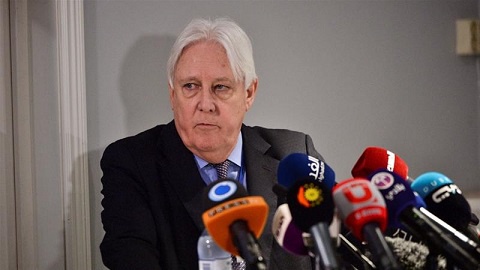 |
| The United Nations’, Martin Griffiths |
GENEVA, Sept 30 (NNN-AGENCIES) — The crisis in Ethiopia that is pushing the war-scarred Tigray region towards starvation is a “stain on our conscience”, the United Nations humanitarian chief says.
Martin Griffiths issued one of the most sharply worded criticisms to date of the worst famine situation in decades, calling on Ethiopia’s incoming new government to lead the country away from “the abyss that it’s peering into”.
Memories of the 1980s famine in Ethiopia, which killed some 1 million people, were still vivid in his mind, “and we fervently hope is not happening at present”.
“That’s what keeps people awake at night,” Griffiths said.
Griffiths also criticized what the UN has called a de facto government blockade of food, medical supplies, and fuel to the Tigray region, where the malnutrition rate is now more than 22 percent.
Meanwhile, just 10 percent of needed humanitarian supplies have been reaching Tigray in recent weeks, Griffiths said, with the lack of fuel and communication making it all but impossible to reach people and assess the true scale of needs.
Mothers in the war-torn region have described feeding their children leaves in a desperate bid to keep them alive, as they move from place to place searching for aid.
Telltale signs of malnutrition, including sluggishness, rashes, loss of appetite, are becoming increasingly frequent.
“Before the war, my daughter was in good physical and mental health… now look at her,” the mother of a 20-month-old in the northern city of Adigrat, said.
“It’s been weeks since she lost her appetite. Presently she cannot walk, she lost her smiley face.”
In July, the UN warned that 400,000 people across Tigray had “crossed the threshold into famine”.
The government has blamed problems with humanitarian aid delivery on the Tigray forces, who long dominated the national government before the country’s current Prime Minister, Abiy Ahmed, sidelined them.
Abiy won a Nobel Peace Prize in 2019 for establishing a peace agreement to end the long stalemate with Eritrea.
He has been accused of war crimes after he sent troops to Tigray to topple the regional ruling party, the Tigray People’s Liberation Front (TPLF). A move that he said was in response to TPLF attacks on army camps.
The war in Ethiopia began last November, as the harvest season began, and the UN has said at least half of the coming harvest will fail.
Abiy’s government has accused humanitarian workers of supporting the Tigray fighters.
Griffiths called such allegations unfair and unacceptable, inviting the government to share any evidence of misconduct by humanitarian workers so that the international body could investigate.
The UN, the United States, and others have urged the warring sides to stop the fighting and take steps towards peace.
But “the war doesn’t look as if it’s finishing any time soon,” Griffiths said.
Ethiopia will see the formation of a new government next week with another five years in office for the prime minister. — NNN-AGENCIES





